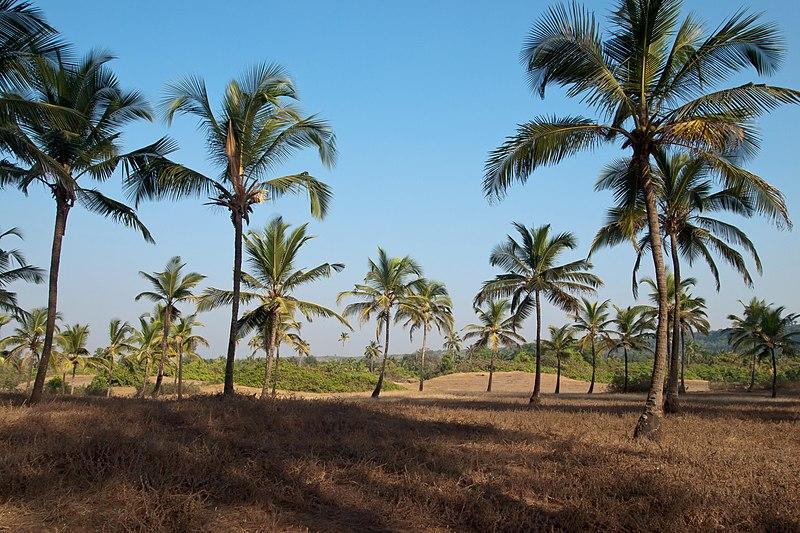Land Use of Large Goa Orchards Changed at the Behest of Real Estate Developers?

Image Courtesy: Wikimedia Commons
New Delhi: The Pramod Sawant-headed Bharatiya Janata Party (BJP) government of Goa has arbitrarily notified more than 65,000 square metres of orchards in the state as “settlement zones” allegedly to facilitate a real estate development firm associated with big names in the Telugu movie and glamour industry.
As per a gazette notification issued by the Goa government on April 20, land-use patterns of four of the six plots were changed based on applications by a Hyderabad-registered real estate firm called Gangareddy Infra Private Limited. This firm was incorporated in February 2022 with fashion model Shilpa Reddy Nalla, a former Mrs India International, and her businessman-husband Preetham Reddy, as directors, per information available in the public domain. Land use of the remaining two plots was changed at the behest of noted Telugu actor Konidela Ramcharan Tej of the superhit RRR movie fame. Tej is associated with four firms registered in Chennai, at least three of which are into recreational, cultural and sporting activities.
All six applications for land-use changes were filed on March 27, 2023, and rectifications to Goa Regional Plan 2021 were notified – apparently after an enquiry – in less than a month’s time.
The six plots are in Morjim village in the Pernem taluka of the North Goa district. In addition, a six-meter-wide road passing through this village was also notified in the regional plan at the behest of Gangareddy Infra Private Limited. The real estate firm had stated in its application that in an “inadvertent error”, the road was “not reflected” earlier in Goa Regional Plan 2021.
Land-use changes to the regional plan were made on the back of a controversial amendment to Goa’s urban planning laws that had earlier been passed by the state’s legislative assembly amidst protests by opposition political parties. The amended Goa Town & Country Planning Act, 2023, came into force on March 2 2023, barely 20 days before the six land-use change applications were filed. The amendment empowers the state government to unilaterally rectify “errors” in Goa Regional Plan 2021 without undertaking any consultations. All six applications had stated that the land-use pattern of each plot, though originally settlement zones in nature, had “erroneously” been classified as orchards in the regional plan issued two years ago.
Goa-based conservationists and legal action groups pointed out the unusual speed with which the BJP state government made arbitrary land-use changes to the state’s regional plan.
“The rezoning of this massive area of the orchard as “settlement” can find no ecological, environmental or town planning justification. The application for zone change was filed three weeks ago and speedily allowed. The plots are not adjacent to any settlement and fall between nature reserves and no-development slopes,” said Goa-based environmental activist Claude Alvares.
It took exactly 50 days for Pramod Sawant’s government to change the land use of the six plots after formally notifying the amended Goa Town & Country Planning Act 2023.
“The changes are wholly arbitrary, unjustified and mala fide. One of the notifications includes zoning changes to support a six-meter road through the properties. How could this also be an error in Regional Plan 2021?” asked Alvares, who is also the director of the NGO Goa Foundation.
In March 2023, the Pramod Sawant government amended Goa Town and Country Planning Act, 1974 (“the Act”) by introducing a sub-section to Section 17, which deals with the “Revision of Regional Plan”. This subsection provides the Chief Town Planner with unilateral powers to rectify or modify “inadvertent errors” in the regional plan.
“If the government thinks that alteration/modification is necessary to be carried out to the regional plan to rectify any inadvertent error that has occurred in the regional plan, and for correction of inconsistent or incoherent zoning proposals in the regional plan, it may direct the chief town planner (planning) to carry out such alteration/modification to the regional plan … the chief town planner (planning) shall by notification in the official gazette carry out such alteration/modification to the regional plan,” states the newly introduced sub-section.
The gazette notification states in all seven cases that scrutiny of the “correction” or “rectification” sought by the applicants was carried out through a registered architect Sarvesh Prakash Naik. After that, the state government further stated that the notification modified the regional plan per the above-mentioned provision.
Interestingly, soon after the gazette notification was issued on April 20, Dean D’Cruz, a former member of the committee, which had been constituted for preparing the regional plan two years ago, lashed out at the Goa government, saying that the term “inadvertent errors” was only a “garb” to undertake largescale land-use changes.
“As a member of the State Level Committee on Regional Plan 2021, I can confidently state that there was absolutely no error in approving the land use that is now sought to be changed. Changing the land use of huge properties goes against basic planning norms. This change does not fall under the definition of an error. This is because • The 7 plots are not contiguous with the existing settlement area. • They are not minor in nature, being over 60,000 sqm. • They appear to be for a specific developer and not in the public interest. • The plots fall between no development slopes and forested areas, thus disconnecting any biodiversity links between the two,” said D’Cruz in a press statement.
Environmental conservationists in Goa had voiced their opposition to land-use changes undertaken by the state government on a case-to-case basis under Section 16B of the Act. This section contains an elaborate procedure for land-use change in the regional plan. Following massive protests by local communities over the depletion of green cover in Goa owing to frequent changes in land use in favour of “settlement zones”, the state government’s town and country planning minister, Vishwajit Rane, had, in September 2022, announced the cancellation of clearances granted under Section 16B of the Act. This section has been challenged in the Goa bench of the Bombay High Court through Public Interest Litigations (PILs) filed by several environmental groups.
“After much thought, I have directed the chief town planner to cancel all cases under Section 16B immediately, which were taken with provisional and final approval … The chief town planner has briefed our lawyers to file an affidavit in the High Court on the government’s decision on Section 16B. Not a single case will be retained,” Rane had announced through a video message.
Nevertheless, the state government amended the Act to introduce a fresh provision for changing land use.
“Through an interim order, the high court has restrained the state government from permitting a zone change in the case of applications made. The state government can process the applications but cannot take a final decision on them to allow a change of zone. Secondly, last year the government announced that none of the applications would be permitted because of several discrepancies, and all were cancelled. However, notwithstanding this announcement, the government has issued a new amendment that errors in the region can be corrected by applying to the government for correction. This is a case of old wine in a new bottle,” the Goa Foundation legal advisor, Norma Alvares, told this reporter.
Text messages to the mobile phone of Preetham Reddy asking, amongst other queries, as to whether his company has any business interests in the four plots, depicted as “settlement zones” following the amendment to the regional plan, did not elicit any response. An email was sent to Preetham Reddy with the queries. A reminder was also sent. But no response was received. An aide of Preetham Reddy told this correspondent that the latter was travelling overseas. Email queries were sent to Ramcharan Tej, and a reminder after that also had not elicited any response when this story was published.
Nalla Preetham Reddy is the maternal grandson of the late Gaddam Ganga Reddy of the Telugu Desam Party, a three-time MP from the Nizamabad Lok Sabha constituency of undivided Andhra Pradesh. On the other hand, Konidela Ramcharan Tej is the son of noted Telugu actor Chiranjeevi who served as the Union Tourism Minister under the United Progressive Alliance (UPA) regime between 2012 and 2014.
The writer is an independent journalist. The views are personal.
Get the latest reports & analysis with people's perspective on Protests, movements & deep analytical videos, discussions of the current affairs in your Telegram app. Subscribe to NewsClick's Telegram channel & get Real-Time updates on stories, as they get published on our website.
























